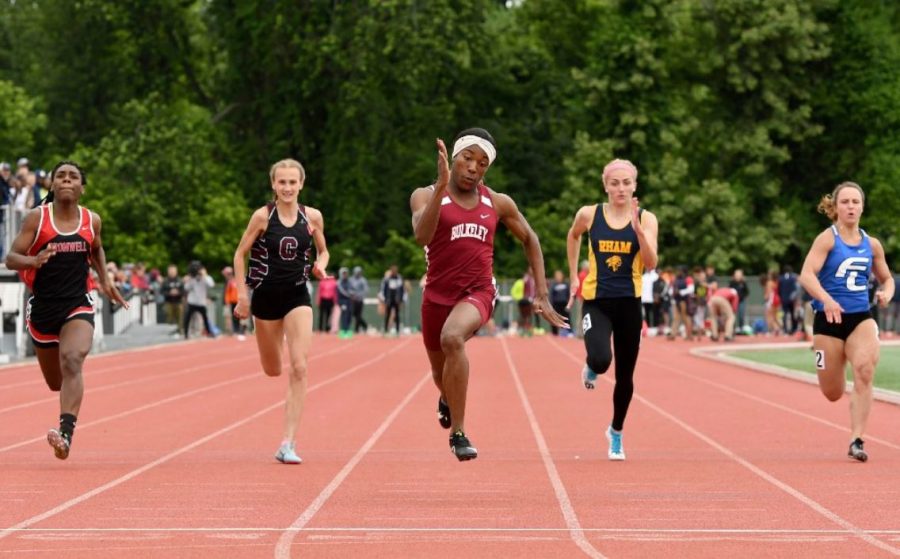Opinion: Should Transgender Athletes Be Allowed to Run With Their Preferred Gender?
December 18, 2020
Title IX is used to prevent discrimination based on sex in educational programs, specifically school sports. But what happens when someone’s assigned sex at birth does not match their preferred gender once they reach the high school and collegiate domain of athletics? Under Title IX and varying state laws, these transgender athletes should be allowed to perform with their preferred gender, whether that be male or female. Unfortunately, it is not always this cut and dry. Controversial debates have popped up surrounding this topic calling into question the biological advantages of these athletes, the perspective of the cisgender athletes competing against the transgender athletes, and how to establish equity and fairness on the playing field. As people create their opinions, they face difficult conversations as they try to preserve the rights of the transgender athletes but the cisgender athletes as well.

I struggle with this topic. I am not a transgender athlete, nor do I know many transgender athletes personally, so I find it troubling to formulate an opinion on something that does not directly affect me or my rights. I believe that these transgender athletes should run with the gender they choose to identify with because, at their core, that is who they are, and no athletic activity should strip them of that. However, I also sympathize with the cisgender athletes who have to compete against bigger, stronger, and faster athletes. Part of me thinks these athletes should take this on as a challenge and push themselves to be better, and part of me wishes there was a way to make it fairer. In my opinion, the best compromise is monitoring the hormone levels of transgender athletes. Hormone supplements are an essential part of an individual’s transition from one gender to another. Likewise, they are an easy and efficient way to measure the change in a transgender athlete’s ability.
Joanna Harper, a researcher at Loughborough University, stated that her research concluded transgender runners taking estrogen supplements face a 12% decrease in their running ability. Likewise, Harper concluded transgender women, in particular, would suffer disadvantages in endurance, agility, and recovery time because their larger frames have to adjust to a smaller muscle mass and less aerobic capacity. As a result of this research, the NCAA requires an athlete to be on hormone supplements for at least of year and have routine blood tests to analyze if their hormones are equivalent to that of cisgender athletes. If this system could be put in place in all states, this debate could easily be put to rest. However, in most states, an individual cannot go on hormone supplements until they are sixteen or older, and routine blood draws are an expensive cost to manage. What happens if a transgender athlete cannot afford these hormones? Is their gender identity ignored? This point is where my opinion gets lost and confused. In a perfect world, I would tell the CIAC to let them play or run where they feel the most themselves, but then the cisgender athletes are left out of the conversation. Suddenly, this conversation evolves from preserving the opportunities of one group, to making the opportunities equal for both groups.
If I was a cisgender runner in Connecticut, and I came in third place behind Andraya Yearwood and Terry Miller, two transgender runners who have broken multiple state records for their track performances, I would probably be upset. But then again, I would be upset if I came in third place anyway. It is easy to blame Andraya and Terry because they are different. They have something people can call out as “unfair” or an “advantage” whereas if two cisgender girls beat me in track, then I have no one to blame but myself. People have advantages all the time: for example, they were born exceptionally tall, they had the money for a personal trainer, or they go to a school college scouts more frequently look at. We do not judge them and make them change the way they play because we are comfortable with their advantages. If I did not get a college scholarship for track, I can then blame the two trans women because they beat me while being trans, something most people are not accustomed to at this point in society. I say we should put our self-pity and ignorance aside and start reflecting on our own performance. Could I have run any faster? Did my time match what college coaches normally look for? Did I work hard enough, or did I accept defeat because I assumed these two women would beat me anyway? It takes a lot of maturity to ask yourself these questions, so again, I do sympathize with the runners who lost to the transgender athletes. However, I would rather encourage self-reflection, education, and perseverance rather than force transgender people to bend over backward for the majority. I think a valid compromise is hormone monitoring and blood draws, if financially possible, but at the end of the day, both sides need to learn how to overcome. If transgender athletes can overcome discrimination, hatred, cruel and transphobic press, and the difficult task of recognizing their true gender identity, then cisgender athletes can push themselves to run a little faster.

















Kelley Edwards • Dec 18, 2020 at 4:22 pm
Great, thoughtful article Emma. During track last year Colleen and I were lucky to befriend Andraya, who was at all of same meets as Morgan. She is an amazing young person who, like her own mom, is gifted athletically and wants to compete. In a sport like running where scholarships are based upon times and not places of finish, I think allowing transgender athletes is ok! Andraya Is a girl who wants to run and compete, with a kind heart and an urge to change the world for the better. She cheered on Colleen and vice versa at the meets and even though we all knew she would win, Andraya was generous at heart and we liked her very much. To us, life is going to present such challenges to Andraya and Terry… so let them run. Even though we love sports and competition, it is “just sports” and we should include transgender athletes. Great job exploring your opinion on this, i really liked reading it Emma!